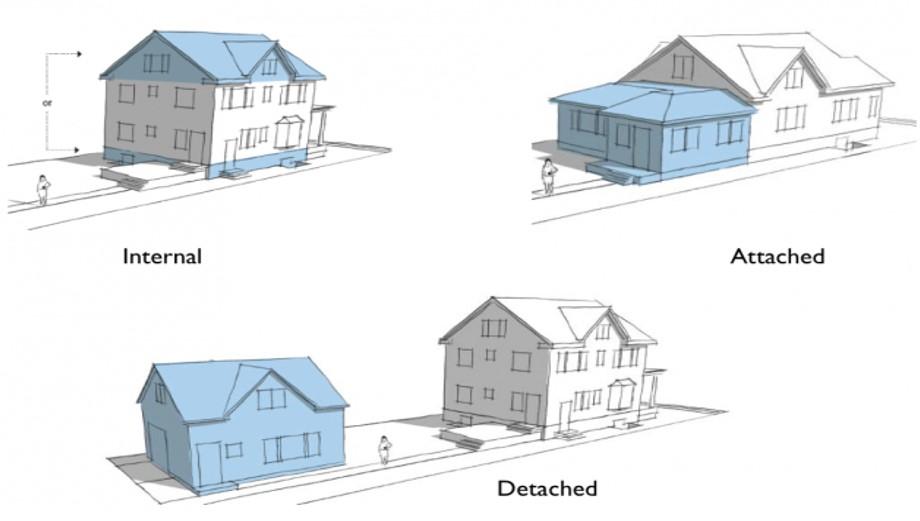As I previously reported, Oakland is in the process of updating its Planning Code regulations pertaining to accessory dwelling units (“ADUs”). On December 21, 2021, the Oakland City Council heard and passed on first reading legislation amending Oakland’s ADU controls (the, “Legislation”). The proposed amendments encourage ADU production by reducing barriers through the adoption of streamlined approval processes consistent with State law. One of the proposed programs by the Legislation is an amnesty program to legalize unpermitted ADUs established and occupied in Oakland prior to January 1, 2021.
The amnesty program consists of two elements that encourage the legalization of existing eligible unpermitted ADUs. First, a property owner may request a waiver from provisions of zoning or development standards, e.g., setbacks, that would preclude the preservation of an eligible unpermitted ADU.
Second, a property owner may request a five year delay in enforcement of Building Code requirements if the unpermitted ADU was built prior to the effective date of the Legislation. The ability to request a five year enforcement delay is available until January 1, 2030. Property owners would be allowed to bring their existing, eligible, unpermitted ADU into compliance with current Building Code standards without incurring any enforcement penalties or fines. This amnesty would last up to five years from the date the enforcement delay is granted, meaning the latest the five-year enforcement delay can be in effect for a specific ADU is December 31, 2034. Amnesty does not apply to structures that pose an immediate risk to public health and safety.
In addition to creating an amnesty program for legalizing existing unpermitted ADUs, the Legislation makes several changes to the existing ADU development controls, including:
- Category Three ADU. The Legislation establishes a new attached ADU category that may combine both converted space within an existing envelope of a multifamily building and a newly built addition to a building footprint.
- Height Increase. Exceeding State law, the Legislation allows two-story ADUs up to a maximum height of 20 feet, as compared to 16 feet, if an ADU complies with the minimum four-foot side and rear setbacks required for detached ADUs.
- Envelope Expansion. The Legislation permits additional envelope expansion as part of the conversion or replacement of an existing accessory structure on a small lot to allow construction of one internal conversion ADU. The ADU must have a total structural footprint no greater than 800 square feet, with the height of the addition no more than 16 feet. A “small lot” is defined as those no greater than 3,000 square feet or no greater than 35 feet in lot width mean.
- Trees. The Legislation calls for project sponsors to plant one new tree on the subject lot or within the public right of way fronting the subject lot per every 500 square feet of detached ADU floor area.
- ADUs in Front Setback. Consistent with State law, the Legislation permits one ADU of a minimum size of 800 square feet, up to 16 feet in height, in the front setback if the lot’s configuration precludes creation of the ADU anywhere else on the lot.
- Multifamily Internal Conversion ADUs. The Legislation clarifies that multifamily properties are permitted one internal conversion ADU or up to a number equal to 25% of the existing units per multifamily building (not per lot). This clarification addresses situations where more than one multifamily building is located on a single lot. In which case, each multifamily building on the lot would be allowed to add internal conversion ADUs up to a number equal to 25% of existing units.
The Legislation is scheduled to return to the Oakland City Council for the second and final hearing for passage. Having been unanimously passed at the December 2021 Council meeting, it is anticipated that the Legislation will be finally passed by the Council next week. We will continue to monitor the Legislation and keep readers updated.
Authored by Reuben, Junius & Rose, LLP Attorney Justin A. Zucker.
The issues discussed in this update are not intended to be legal advice and no attorney-client relationship is established with the recipient. Readers should consult with legal counsel before relying on any of the information contained herein. Reuben, Junius & Rose, LLP is a full service real estate law firm. We specialize in land use, development and entitlement law. We also provide a wide range of transactional services, including leasing, acquisitions and sales, formation of limited liability companies and other entities, lending/workout assistance, subdivision and condominium work.


